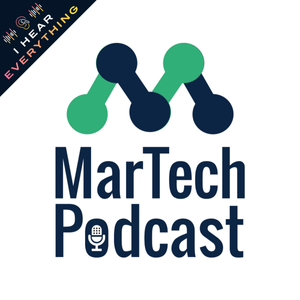
Winter 2023 Newsroom
03/16/23 • 37 min
With Nina Müller, Ethical Commerce Alliance Director and host of the Ethical Allies podcast.
__
This was a pretty active season in terms of regulatory updates and decisions or guidelines coming out of supervisory bodies:
Spain’s AEPD issued a decision on the use of Google Analytics by the Royal Academy of Spanish Language (“RAE”), becoming the first EU Data Protection Agency to see the glass half full in the use of the widespread digital data collection service (having been considered high-risk in Denmark, Italy, France, the Netherlands and Austria). It must however be noted that the RAE was only using the most basic version of the tool, without any AdTech integrations or individual user profiling - and in this regard aligned with the CNIL’s long-standing guidelines for the valid use of the tool.
At EU level, the Artificial Intelligence Act (which we have covered this quarter in a couple of Masters of Privacy interviews) made fast progress with the Council adopting its final position. At the same time, new common rules on cybersecurity became a reality with the approval of the NS2 Directive (or v2 of the Network and Information Security Directive) on November 28th. The updated framework covers incident response, supply chain security and encryption among other things, leaving less wiggle room for Member States to get creative when it comes to “essential sectors” (such as energy, banking, health, or digital infrastructure).
Across the Channel, the UK’s Data Protection Agency (ICO) issued brand new guidelines on international data transfers, providing a practical tool for businesses to properly carry out Transfer Risk Assessments and making it clear that either such tool or the guidelines provided by the European Data Protection Board will be considered valid.
Already into the new year, the European Data Protection Board (EDPB) issued two important reports, on valid consent in the context of cookie banners (in the hope to agree on a common approach in the face of multiple NOYB complaints across the EU) and the use of cloud-based services by the public sector. The former concluded that the vast majority of DPAs (Supervisory Authorities) did not accept hiding the “Reject All” button in a second layer - which most notably leaves Spain’s AEPD as the odd one out. They did all agree on the non-conformity of: a) pre-ticked consent checkboxes on second layer; b) a reliance on legitimate interest; c) the use of dark patterns in link design or deceptive button colors/contrast; and d) the inaccurate classification of essential cookies.
The latter concluded that public bodies across the EU may find it hard to provide supplementary measures when sending personal data to a US-based cloud (as per Schrems II requirements) in the context of some Software as a Service (SaaS) implementations, suggesting that switching to an EEA-sovereign Cloud Service Provider (CSP) would solve the problem and getting many to wonder whether it also refers to US-owned CSPs, which would leave few options on the table and none able to compete at many levels in terms of features or scale.
All of which can easily lead us to the latest update on the EU-US Data Privacy Framework:
The EDPB released its non-binding opinion on the status of the EU-US Data Privacy Framework (voicing concerns about proportionality, the data protection review court and bulk data collection by national security agencies). The EU Commission will now proceed to ask EU Member States to approve it with the hope of issuing an adequacy decision by July 2023. This would do away with all the headaches derived from the Schrems II ECJ decision (including growing pressure to store personal data in EU-based...
With Nina Müller, Ethical Commerce Alliance Director and host of the Ethical Allies podcast.
__
This was a pretty active season in terms of regulatory updates and decisions or guidelines coming out of supervisory bodies:
Spain’s AEPD issued a decision on the use of Google Analytics by the Royal Academy of Spanish Language (“RAE”), becoming the first EU Data Protection Agency to see the glass half full in the use of the widespread digital data collection service (having been considered high-risk in Denmark, Italy, France, the Netherlands and Austria). It must however be noted that the RAE was only using the most basic version of the tool, without any AdTech integrations or individual user profiling - and in this regard aligned with the CNIL’s long-standing guidelines for the valid use of the tool.
At EU level, the Artificial Intelligence Act (which we have covered this quarter in a couple of Masters of Privacy interviews) made fast progress with the Council adopting its final position. At the same time, new common rules on cybersecurity became a reality with the approval of the NS2 Directive (or v2 of the Network and Information Security Directive) on November 28th. The updated framework covers incident response, supply chain security and encryption among other things, leaving less wiggle room for Member States to get creative when it comes to “essential sectors” (such as energy, banking, health, or digital infrastructure).
Across the Channel, the UK’s Data Protection Agency (ICO) issued brand new guidelines on international data transfers, providing a practical tool for businesses to properly carry out Transfer Risk Assessments and making it clear that either such tool or the guidelines provided by the European Data Protection Board will be considered valid.
Already into the new year, the European Data Protection Board (EDPB) issued two important reports, on valid consent in the context of cookie banners (in the hope to agree on a common approach in the face of multiple NOYB complaints across the EU) and the use of cloud-based services by the public sector. The former concluded that the vast majority of DPAs (Supervisory Authorities) did not accept hiding the “Reject All” button in a second layer - which most notably leaves Spain’s AEPD as the odd one out. They did all agree on the non-conformity of: a) pre-ticked consent checkboxes on second layer; b) a reliance on legitimate interest; c) the use of dark patterns in link design or deceptive button colors/contrast; and d) the inaccurate classification of essential cookies.
The latter concluded that public bodies across the EU may find it hard to provide supplementary measures when sending personal data to a US-based cloud (as per Schrems II requirements) in the context of some Software as a Service (SaaS) implementations, suggesting that switching to an EEA-sovereign Cloud Service Provider (CSP) would solve the problem and getting many to wonder whether it also refers to US-owned CSPs, which would leave few options on the table and none able to compete at many levels in terms of features or scale.
All of which can easily lead us to the latest update on the EU-US Data Privacy Framework:
The EDPB released its non-binding opinion on the status of the EU-US Data Privacy Framework (voicing concerns about proportionality, the data protection review court and bulk data collection by national security agencies). The EU Commission will now proceed to ask EU Member States to approve it with the hope of issuing an adequacy decision by July 2023. This would do away with all the headaches derived from the Schrems II ECJ decision (including growing pressure to store personal data in EU-based...
Previous Episode

Nicola Newitt: the legal case for Data Clean Rooms
Nicola Newitt is a UK qualified lawyer who trained in private practice and worked at Slaughter and May before moving in-house to start her privacy career in Bupa’s international health insurance business. She is now Senior Privacy and Product Counsel at InfoSum, a leading Data Clean Room.
With Nicola we have covered a very hot topic for anyone in the Marketing Technology or AdTech spaces. Our discussion included the following questions:
- Who’s the controller and who’s the processor in a Data Clean Room scenario? Do we have a joint controllership when for instance a publisher or a retailer partners with a consumer brand?
- Which legal basis do we rely on for each of its three main use cases?
- Can different options at data activation level alter our legal approach or safeguards?
- How does an independent Data Clean Room compare to a Walled Garden Clean Room from a privacy point of view?
References:
Next Episode

Mattia Fosci: The publisher’s dilemma in a first-party data world
As a lawyer turned entrepreneur, Dr. Mattia Fosci combines privacy and AdTech expertise. He is the founder and CEO of Anonymised, an advertising platform that helps publishers understand and monetise their audiences at scale across all browsers and devices, using only anonymous data.
We have covered or touched on:
- The many limitations of contextual advertising and why it will not solve the most pressing issues
- How ID-based alternatives are worse than cookies
- The manner in which browsers are exercising greater control over the open web
- The deafening noise in the AdTech market when it comes to cookieless solutions, and how overwhelming this is for publishers with limited technical resources
- The competitive issues arising from cross-site interest-based cohorts (à la Topics API in the Google Privacy Sandbox)
- How to get advertisers and their media agencies to dare turn their backs on a highly defective status quo - thus allowing publishers to move away from their own mouse wheel.
References:
If you like this episode you’ll love
Episode Comments
Generate a badge
Get a badge for your website that links back to this episode
<a href="https://goodpods.com/podcasts/masters-of-privacy-437262/winter-2023-newsroom-59842359"> <img src="https://storage.googleapis.com/goodpods-images-bucket/badges/generic-badge-1.svg" alt="listen to winter 2023 newsroom on goodpods" style="width: 225px" /> </a>
Copy




